新人教版 七年级英语下册知识点全总结
- 格式:docx
- 大小:31.16 KB
- 文档页数:21
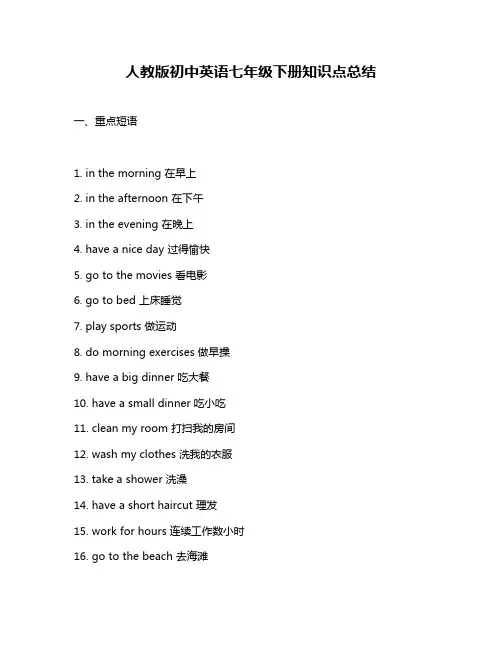
人教版初中英语七年级下册知识点总结一、重点短语1. in the morning 在早上2. in the afternoon 在下午3. in the evening 在晚上4. have a nice day 过得愉快5. go to the movies 看电影6. go to bed 上床睡觉7. play sports 做运动8. do morning exercises 做早操9. have a big dinner 吃大餐10. have a small dinner 吃小吃11. clean my room 打扫我的房间12. wash my clothes 洗我的衣服13. take a shower 洗澡14. have a short haircut 理发15. work for hours 连续工作数小时16. go to the beach 去海滩17. on the weekend 在周末18. listen to music 听音乐19. have a party 举办聚会20. watch TV 看电视21. play computer games 玩电脑游戏22. in the pool 在游泳池里23. go to the zoo 去动物园24. in the mountains 在山里25. have fun 玩得开心26. the great wall 长城27. many places of interest 名胜古迹28. be ready for 为……准备好29. stay healthy 保持健康30. how much 多少31. would you like 一些……吗?32. some noodles 一些面条33. order a pizza 定一个披萨饼34. make a phone order 电话订购35. would you like to do sth 你愿意做某事吗?36. want to do sth 想做某事37. would you like +名词你愿意要……吗?38. would you like +动词不定式你愿意……吗?39. choose some food 选择一些食物40. order the food 订购食物41. be careful 当心;小心42. not much 不多;少量的43. be ready to do sth 准备好做某事。
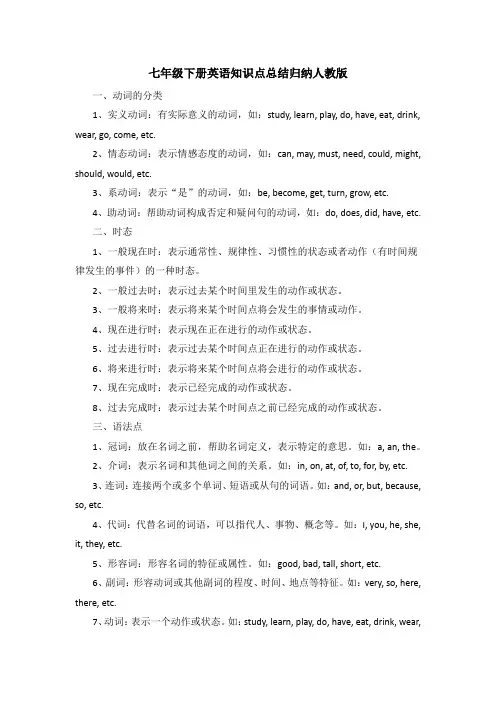
七年级下册英语知识点总结归纳人教版一、动词的分类1、实义动词:有实际意义的动词,如:study, learn, play, do, have, eat, drink, wear, go, come, etc.2、情态动词:表示情感态度的动词,如:can, may, must, need, could, might, should, would, etc.3、系动词:表示“是”的动词,如:be, become, get, turn, grow, etc.4、助动词:帮助动词构成否定和疑问句的动词,如:do, does, did, have, etc.二、时态1、一般现在时:表示通常性、规律性、习惯性的状态或者动作(有时间规律发生的事件)的一种时态。
2、一般过去时:表示过去某个时间里发生的动作或状态。
3、一般将来时:表示将来某个时间点将会发生的事情或动作。
4、现在进行时:表示现在正在进行的动作或状态。
5、过去进行时:表示过去某个时间点正在进行的动作或状态。
6、将来进行时:表示将来某个时间点将会进行的动作或状态。
7、现在完成时:表示已经完成的动作或状态。
8、过去完成时:表示过去某个时间点之前已经完成的动作或状态。
三、语法点1、冠词:放在名词之前,帮助名词定义,表示特定的意思。
如:a, an, the。
2、介词:表示名词和其他词之间的关系。
如:in, on, at, of, to, for, by, etc.3、连词:连接两个或多个单词、短语或从句的词语。
如:and, or, but, because, so, etc.4、代词:代替名词的词语,可以指代人、事物、概念等。
如:I, you, he, she, it, they, etc.5、形容词:形容名词的特征或属性。
如:good, bad, tall, short, etc.6、副词:形容动词或其他副词的程度、时间、地点等特征。
如:very, so, here, there, etc.7、动词:表示一个动作或状态。
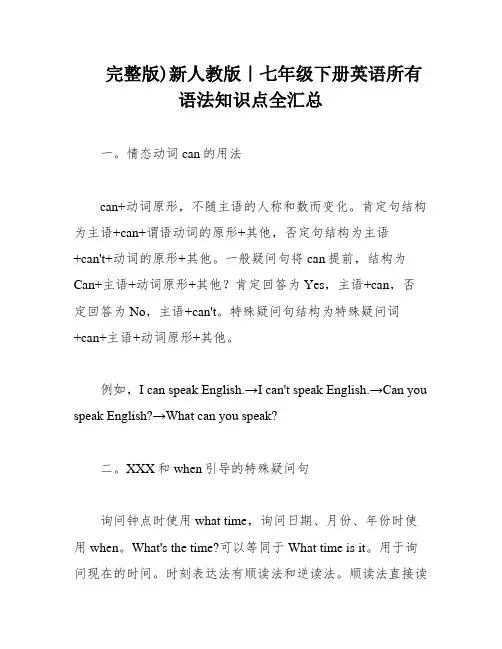
完整版)新人教版|七年级下册英语所有语法知识点全汇总一。
情态动词can的用法can+动词原形,不随主语的人称和数而变化。
肯定句结构为主语+can+谓语动词的原形+其他,否定句结构为主语+can't+动词的原形+其他。
一般疑问句将can提前,结构为Can+主语+动词原形+其他?肯定回答为Yes,主语+can,否定回答为No,主语+can't。
特殊疑问句结构为特殊疑问词+can+主语+动词原形+其他。
例如,I can speak English.→I can't speak English.→Can you speak English?→What can you speak?二。
XXX和when引导的特殊疑问句询问钟点时使用what time,询问日期、月份、年份时使用when。
What's the time?可以等同于What time is it。
用于询问现在的时间。
时刻表达法有顺读法和逆读法。
顺读法直接读出“钟点+分钟”的数字,例如7:05读作seven five,8:16读作eight sixteen。
逆读法使用介词past或to,先说分钟再说钟点。
当分钟不超过30分钟时,即30,用to表示,结构为“所差分钟(即60—所过分钟数)+to+下一个整点”,to译成“差”,差几分钟到几点,例如4:o to five。
当分钟为30分钟时用half表示,当分钟为15分钟时用a XXX表示。
三。
how引导的特殊疑问句how引导的特殊疑问句用于询问交通方式,其答语分为三种情况:a。
take a/an/the+交通工具(单数);b。
by+交通工具(单数);XXX限定词+交通工具。
例如,How do you go to school every day。
可以回答为I take a bus to go to school every day./I go to school by bus every day./I go to school on the bus every day.How far is something。
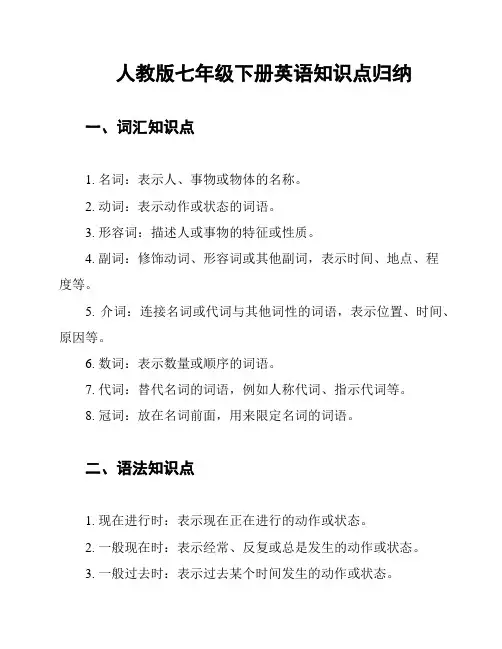
人教版七年级下册英语知识点归纳
一、词汇知识点
1. 名词:表示人、事物或物体的名称。
2. 动词:表示动作或状态的词语。
3. 形容词:描述人或事物的特征或性质。
4. 副词:修饰动词、形容词或其他副词,表示时间、地点、程
度等。
5. 介词:连接名词或代词与其他词性的词语,表示位置、时间、原因等。
6. 数词:表示数量或顺序的词语。
7. 代词:替代名词的词语,例如人称代词、指示代词等。
8. 冠词:放在名词前面,用来限定名词的词语。
二、语法知识点
1. 现在进行时:表示现在正在进行的动作或状态。
2. 一般现在时:表示经常、反复或总是发生的动作或状态。
3. 一般过去时:表示过去某个时间发生的动作或状态。
4. 一般将来时:表示将来要发生的动作或状态。
5. 祈使句:表示请求、命令、建议等的句子类型。
6. 疑问句:表示疑问的句子类型。
7. 定冠词与不定冠词的用法:表示特指或泛指的名词前需要使用不同的冠词。
三、阅读理解技巧
1. 细节理解:根据文章中的具体信息来回答问题。
2. 推理判断:根据已有信息进行推理,得出结论。
3. 主题概括:对文章的主要内容进行概括。
4. 上下文猜词:根据上下文的语境猜测单词的意思。
5. 标题选取:选择合适的标题来概括文章的内容。
以上是人教版七年级下册英语知识点的简要归纳,希望对你有所帮助!。
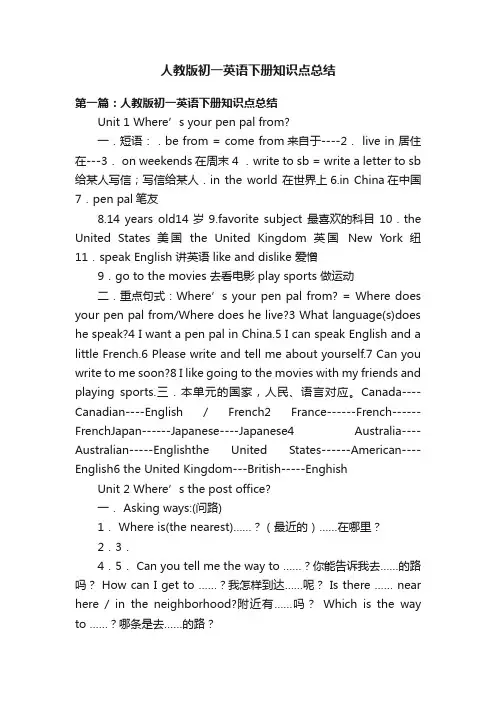
人教版初一英语下册知识点总结第一篇:人教版初一英语下册知识点总结Unit 1 Where’s your pen pal from?一.短语:.be from = come from来自于----2. live in 居住在---3. on weekends 在周末 4 .write to sb = write a letter to sb 给某人写信;写信给某人.in the world 在世界上6.in China在中国7.pen pal笔友8.14 years old14岁9.favorite subject 最喜欢的科目10.the United States 美国the United Kingdom 英国New York 纽11.speak English 讲英语 like and dislike 爱憎9.go to the movies 去看电影play sports 做运动二.重点句式:Where’s your pen p al from? = Where does your pen pal from/Where does he live?3 What language(s)does he speak?4 I want a pen pal in China.5 I can speak English and a little French.6 Please write and tell me about yourself.7 Can you write to me soon?8 I like going to the movies with my friends and playing sports.三.本单元的国家,人民、语言对应。
Canada----Canadian----English / French2 France------French------FrenchJapan------Japanese----Japanese4 Australia----Australian-----Englishthe United States------American----English6 the United Kingdom---British-----EnghishUnit 2 Where’s the post office?一. Asking ways:(问路)1.Where is(the nearest)……?(最近的)……在哪里?2.3.4.5.Can you tell me the way to ……?你能告诉我去……的路吗?How can I get to ……?我怎样到达……呢?Is there …… near here / in the neighborhood?附近有……吗?Which is the way to ……?哪条是去……的路?二.Showing the ways:(指路)1.Go straight down / along this street.沿着这条街一直走。
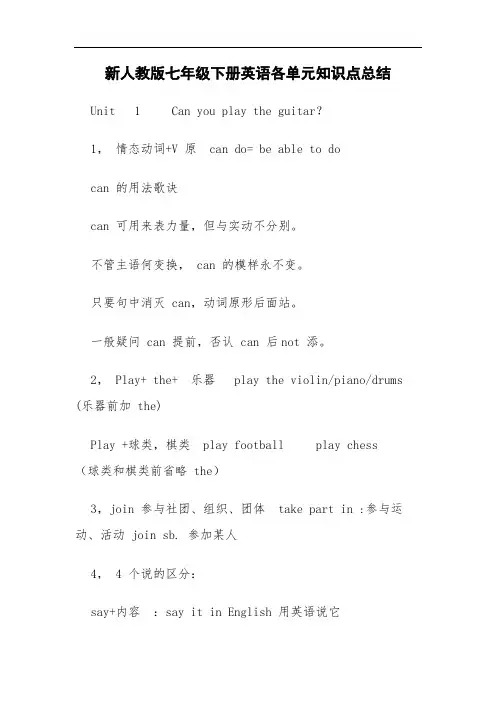
新人教版七年级下册英语各单元知识点总结Unit 1 Can you play the guitar?1,情态动词+V 原can do= be able to docan 的用法歌诀can 可用来表力量,但与实动不分别。
不管主语何变换, can 的模样永不变。
只要句中消灭 can,动词原形后面站。
一般疑问 can 提前,否认 can 后not 添。
2, Play+ the+ 乐器 play the violin/piano/drums (乐器前加 the)Play +球类,棋类play football play chess (球类和棋类前省略 the)3,join 参与社团、组织、团体take part in :参与运动、活动 join sb. 参加某人4, 4 个说的区分:say+内容:say it in English 用英语说它speak+语言: speak English 说英语talk 谈论 talk about sth. 谈论某事 talkwith/to sb 和某人交谈tell 告知,表达tell sb. (not)to do sth告知某人(不)去做某事(tell a story)tell stories/ jokes 讲故事/笑话5, want 的用法:想要(动词)(1) want to do sth.= would like to do sth 想要做某事(2) want (sb)to do sth.= would like +(sb)to do sth 想要做某事6, 4 个也的区分: too 确定句末(前面加逗号)either 否认句末(前面加逗号)also 句中,放在实意动词前, be 动词和情态动词之后as well 口语中(前面不加逗号)7, be good at =do well in+ V-ing/N. 擅长于(做)…… be good at playing soccer用法拓展:be good for 对…有益(be bad for 对…有害)be good to 对…友好(good 可用 friendly,nice,kind 替换)be good with 和…相处好=get on/ along well with8,特别疑问句的构成:疑问词+一般疑问句9, How/ what about+V-ing …怎么样?(表建议)What about playing basketball ? 10,感官动词(look, sound, taste, smell, feel)+adj/ like11.选择疑问句:答复不能直接用 Yes 或者 No,要从中选择一个答复Can you play the piano,,the drums,or the guitar? Ican play the drums.你会弹奏钢琴,敲鼓,或者弹吉他吗?我会打鼓12,students wanted for school show 学校演出招募学生(wanted 表示招募,含有被动意义)13,show sth to sb=show sb sth 给某人看某物 show me your book=show your book to me on show,意为“在展出”give sth to sb=give sb sth 给某人某物give me a pen =give a pen to me14,help sb (to)do sth 帮助某人做某事help sb with sth 帮助某人某事with sb’s help= with the help of sb 在某人的帮助下help oneself to 任凭享用15,be busy doing sth= be busy with sth 忙于做某事,be busy doing his homework= be busy with his homework 忙于他的家庭作业116,sb. need to do sth 某人需要做某事 need sb. to do sth 需要某人做某事17,be free= have time 有空的be busy 劳碌的18,make friends 交朋友 make friends with sb.与某人交朋友19,call sb at +电话号码给某人打---电话20,on the weekend= on weekends 在周末21,English-speaking students 说英语的学生(带有连词符,有形容词性质)22,do kung fu 表演功夫23,in, on 和at 在表达时间方面的区分①in+年、月、季节;泛指在上午,下午,晚上,如: inthe morning(afternoon, evening). in spring 在春季in September 在九月②on 指在某一天或某一天的上午,下午,晚上,具体到某一天、节日如: on Monday, on Sunday afternoon, on July 1, 1999 on New Year’s Day③at,一般表示点时间,如 at six o’clock, at three thirty.、习惯用法: at night, at noon,留意:在英语中,假设时间名词前用 this, last, next 等修饰时,像这样的表示,“在某时”的时间短语前,并不需要任何介词。
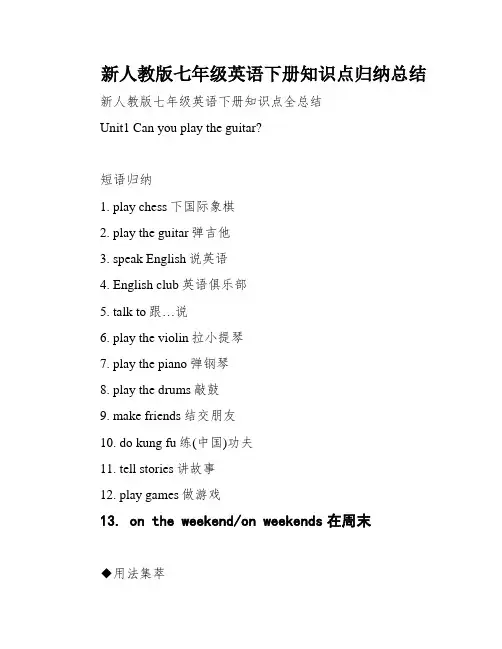
新人教版七年级英语下册知识点归纳总结新人教版七年级英语下册知识点全总结Unit1 Can you play the guitar?短语归纳1. play chess下国际象棋2. play the guitar弹吉他3. speak English说英语4. English club英语俱乐部5. talk to跟…说6. play the violin拉小提琴7. play the piano弹钢琴8. play the drums敲鼓9. make friends结交朋友10. do kung fu练(中国)功夫11. tell stories讲故事12. play games做游戏13. on the weekend/on weekends在周末◆用法集萃1. play +棋类/球类下…棋/打…球2. play the +西洋乐器弹/拉…乐器3. be good at doing sth.= do well in doing sth.善于做某事4. be good with sb.和某人相处地好5. need sb. to do sth.需求或人做某事6. can +动词原形能/会做某事7. a little +不成数名词一点儿…8. join the…club加入…俱乐部9. like to do sth. =love to do sth.喜欢/喜爱做某事◆典句必背1.—Can you draw?你会画画吗?—Yes, I can./No, I can’t.是的,我会。
/不,我不会。
2.—What club do you want to join?你想插手哪一个俱乐部?—I want to join the chess club.我想加入国际象棋俱乐部。
3. You can join the English club.你可以加入英语俱乐部。
4. Sounds good./That sounds good.听上去很好。
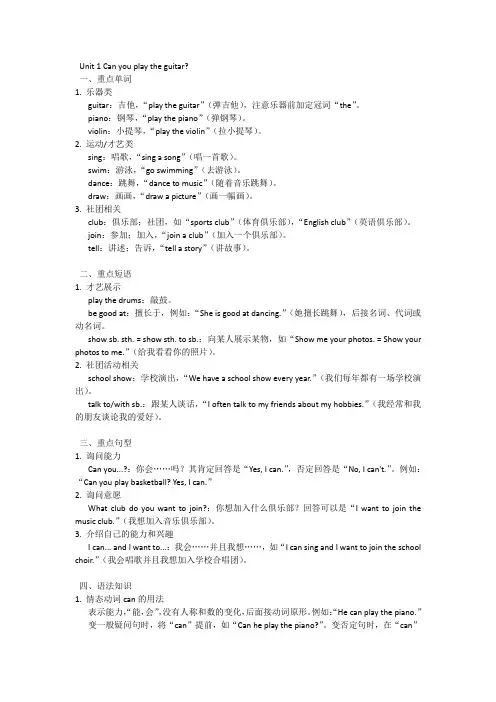
Unit 1 Can you play the guitar?一、重点单词1. 乐器类guitar:吉他,“play the guitar”(弹吉他),注意乐器前加定冠词“the”。
piano:钢琴,“play the piano”(弹钢琴)。
violin:小提琴,“play the violin”(拉小提琴)。
2. 运动/才艺类sing:唱歌,“sing a song”(唱一首歌)。
swim:游泳,“go swimming”(去游泳)。
dance:跳舞,“dance to music”(随着音乐跳舞)。
draw:画画,“draw a picture”(画一幅画)。
3. 社团相关club:俱乐部;社团,如“sports club”(体育俱乐部),“English club”(英语俱乐部)。
join:参加;加入,“join a club”(加入一个俱乐部)。
tell:讲述;告诉,“tell a story”(讲故事)。
二、重点短语1. 才艺展示play the drums:敲鼓。
be good at:擅长于,例如:“She is good at dancing.”(她擅长跳舞),后接名词、代词或动名词。
show sb. sth. = show sth. to sb.:向某人展示某物,如“Show me your photos. = Show your photos to me.”(给我看看你的照片)。
2. 社团活动相关school show:学校演出,“We have a school show every year.”(我们每年都有一场学校演出)。
talk to/with sb.:跟某人谈话,“I often talk to my friends about my hobbies.”(我经常和我的朋友谈论我的爱好)。
三、重点句型1. 询问能力Can you...?:你会……吗?其肯定回答是“Yes, I can.”,否定回答是“No, I can't.”。
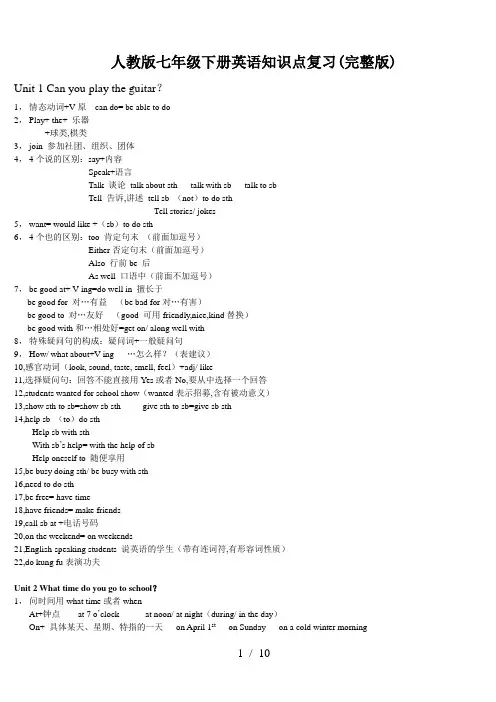
人教版七年级下册英语知识点复习(完整版) Unit 1 Can you play the guitar?1,情态动词+V原can do= be able to do2,Play+ the+ 乐器+球类,棋类3,join 参加社团、组织、团体4,4个说的区别:say+内容Speak+语言Talk 谈论talk about sth talk with sb talk to sbTell 告诉,讲述tell sb (not)to do sthTell stories/ jokes5,want= would like +(sb)to do sth6,4个也的区别:too 肯定句末(前面加逗号)Either否定句末(前面加逗号)Also 行前be 后As well 口语中(前面不加逗号)7,be good at+ V-ing=do well in 擅长于be good for 对…有益(be bad for对…有害)be good to 对…友好(good 可用friendly,nice,kind替换)be good with和…相处好=get on/ along well with8,特殊疑问句的构成:疑问词+一般疑问句9,How/ what about+V-ing …怎么样?(表建议)10,感官动词(look, sound, taste, smell, feel)+adj/ like11,选择疑问句:回答不能直接用Yes或者No,要从中选择一个回答12,students wanted for school show(wanted表示招募,含有被动意义)13,show sth to sb=show sb sth give sth to sb=give sb sth14,help sb (to)do sthHelp sb with sthWith sb’s help= with the help of sbHelp oneself to 随便享用15,be busy doing sth/ be busy with sth16,need to do sth17,be free= have time18,have friends= make friends19,call sb at +电话号码20,on the weekend= on weekends21,English-speaking students 说英语的学生(带有连词符,有形容词性质)22,do kung fu表演功夫Unit 2 What time do you go to school?1,问时间用what time或者whenAt+钟点at 7 o’clock at noon/ at night(during/ in the day)On+ 具体某天、星期、特指的一天on April 1st on Sunday on a cold winter morningIn +年、月、上午、下午、晚上2,时间读法:顺读法逆读法:分钟≤30用past five past eight(8:05)half past eight(8:30)分钟>30用to a quarter to ten(9:45)整点用…o’clock 7 o’clock(7:00)3,3个穿的区别:wear 表状态,接服装、手套、眼镜、香水等Put on 表动作,接服装Dress 表动作,接sb/ oneself get dressed穿衣3,感叹句:How+adj+主谓!How+adj+a/an +n单+主谓!What+ a/an +adj+ n单+主谓!What+ adj+ n复/ 不可数+主谓!4,from…to…5,be/ arrive late for6,频度副词(行前be 后)Always usually often sometimes seldom hardly never7,一段时间前面要用介词for for half an hour for five minutes8,eat/ have…for breakfast/ lunch/ dinner/ supper9,either…or10,a lot of=lots of11,it is +adj+for sb +to do sth (adj修饰to do sth)It is important for me to learn English.it is +adj+of sb +to do sth (adj修饰sb)It is kind/ friendly/ nice of you to help me.Unit 3 How do you get to school?1,疑问词How 如何(方式)how long 多长(时间)答语常用“(For/ about +)时间段”how far多远(距离)答语常用“(It’s +)数词 +miles/ meters/ kilometers”how often多久一次(频率)答语常用“Always/ often/ every day/…”或“次数+时间”等表频率的状语How soon多快,多久以后,常用在将来时中。

人教版英语七年级下册Units1-4单元知识点归纳总结Unit1Can you play the guitar?一、重点短语1.at the old people's home在敬老院2.be good at singing善于唱歌3.be good at swimming善于游泳4.be good at dancing跳舞5.be good with old people与老人相处得好6.be in our school music festival参加我们学校的音乐节e and show us来给我们展示一下e to the Students'Sports Center来学生运动中心9.do Chinese kung fu表演中国功夫10.English-speaking students说英语的学生11.help with sports在运动方面提供帮助12.in the music room在音乐室13.in the school music club在学校音乐俱乐部14.in the school show在学校汇演中15.join the swimming club加入游泳俱乐部16.like drawing/like to draw喜欢画画17.make friends with sb.和某人交朋友18.musicians wanted招聘音乐家19.need help to teach music需要帮助去教音乐20.on the weekend/on weekends(在)周末21.play chess下国际象棋22.play games with people与人玩游戏23.play the drums打鼓24.play the guitar弹吉他25.play the piano弹钢琴26.play the violin拉小提琴27.students wanted for the school show为学校演出招募学生28.tell stories讲故事29.the story telling club讲故事俱乐部30.talk to/with和某人谈话31.talk with sb.about sth.和某人谈论某事二、重点句型1.—Can you play the guitar or the violin?你会弹吉他还是拉小提琴?—I can play the guitar.我会弹吉他。
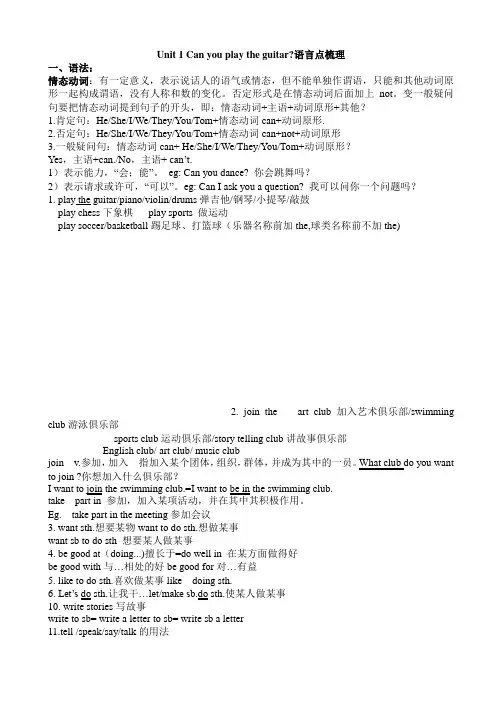
Unit 1 Can you play the guitar?语言点梳理一、语法:情态动词:有一定意义,表示说话人的语气或情态,但不能单独作谓语,只能和其他动词原形一起构成谓语,没有人称和数的变化。
否定形式是在情态动词后面加上not。
变一般疑问句要把情态动词提到句子的开头,即:情态动词+主语+动词原形+其他?1.肯定句:He/She/I/We/They/You/Tom+情态动词can+动词原形.2.否定句:He/She/I/We/They/You/Tom+情态动词can+not+动词原形3.一般疑问句:情态动词can+ He/She/I/We/They/You/Tom+动词原形?Yes,主语+can./No,主语+ can’t.1)表示能力,“会;能”。
eg: Can you dance? 你会跳舞吗?2)表示请求或许可,“可以”。
eg: Can I ask you a question? 我可以问你一个问题吗?1. play the guitar/piano/violin/drums弹吉他/钢琴/小提琴/敲鼓play chess下象棋play sports 做运动play soccer/basketball踢足球、打篮球(乐器名称前加the,球类名称前不加the)2. join the art club加入艺术俱乐部/swimming club游泳俱乐部sports club运动俱乐部/story telling club讲故事俱乐部English club/ art club/ music clubjoin v.参加,加入指加入某个团体,组织,群体,并成为其中的一员。
What club do you want to join ?你想加入什么俱乐部?I want to join the swimming club.=I want to be in the swimming club.takeEg. take part in the meeting参加会议3. want sth.想要某物want to do sth.想做某事want sb to do sth 想要某人做某事4. be good at(doing...)擅长于=do well in 在某方面做得好be good with与…相处的好be good for对…有益5. like to do sth.喜欢做某事like doing sth.6. Let’s do sth.让我干…let/make sb.do sth.使某人做某事10. write stories写故事write to sb= write a letter to sb= write sb a letter11.tell /speak/say/talk的用法1) tell讲述一件事实或故事等及物动词tell sb. sth 给某人讲某事=tell sth to sb 把某事告诉某人tell sb. to do sth 告诉某人做某事tell stories讲故事=tell a story tell a lie撒谎2)speak v. 主要是讲说话的能力,往往接语言speak English讲英语3)talk 为不及物动词往往加介词再接宾语talk to sb.和…交谈/talk with sb.和…交谈(指双方)4)say往往接说话的内容eg.Our teacher says we should study hard.say it in English用英语说它12. make friends with sb.和…交朋友13. play games with sb.和…做游戏14. help sb. with sth.= help sb. (to) do sth.帮助某人做某事15. call sb. at +电话号码给某人打电话拨+号码16. on /at the weekend 在周末on weekends after school放学后17.do Chinese kung fu 打中国功夫18.be free 空闲的19. sing very well 唱得好That sounds good. 那听起来很好20.English-speaking students 讲英语的学生学生运动中心23.also /too/eitheralso/too用在肯定句,also 用于句中,too 用于句尾,either用于否定句句未eg. I am a student . He is a student,too. I am a student . He is also a student.I am not a student . He is not a student, either.24.and/or 连接两个并列成分eg.I can sing and dance.(and用于肯定句)I can’t sing or dance.(or用于否定句)Can you sing or dance ?(or用于选择疑问句“或者”)25.at27. need to do sth需要干某事need sb. to do sth 需要某人干某事28.wanted students for School show学校表演招聘学生v.展示;给….看… show sb. Sth= show Sth to sb.给某人展示n.节目;表演TV show电视节目29.teach v.教,讲授teacher n.教师teach sb.English教某人英语teach sb. sth .= teach sth to sb.教给某人某事=教某事给某人teach sb.to do sth教给某人做某事30.music n.音乐musician n. 音乐家31.piano (pl.) pianosUnit 2 What time do you go to school?知识点梳理1.What time do you get up?What time +助动词do/does +主语+动词原形,询问某人做某事的具体时间。
七年级下册英语知识点总结归纳人教版七年级下册英语知识点总结归纳(人教版)在七年级下册英语学习中,我们学习了许多重要的知识点。
这些知识点涵盖了语法、词汇、句子结构以及阅读理解等方面。
下面,我们将对这些知识点进行总结归纳,以帮助大家更好地复习和掌握。
一、语法知识点1. 一般现在时:表示经常性的动作或客观事实。
主语为第三人称单数时,动词要加-s或-es。
例句:He usually goes to school by bike.They often play football on weekends.2. 一般过去时:表示过去某个时间发生的动作或存在的状态。
动词要用其过去式形式。
例句:I watched a movie last night.She lived in China for two years.3. 现在进行时:表示说话时正在进行的动作。
构成:主语+be动词(am, is, are)+动词-ing。
例句:They are playing basketball in the park.We are learning English now.4. 一般将来时:表示将来要发生的动作或存在的状态。
构成:主语+will+动词原形。
例句:I will visit my grandparents next weekend.She will be a doctor in the future.5. 情态动词:can, may, must等,表示能力、许可、必须等。
例句:You can go to the park with us.Students must wear school uniforms.6. 宾语从句:用来充当主句中动词的宾语的从句。
例句:I think that he is a good student.She knows where the nearest supermarket is.二、词汇知识点1. 动词短语:由动词与副词/介词组成的短语。
更新新人教版七年级英语下册知识点全1. 语法知识点1.1 简单现在时•表示经常、习惯性或现在的状态。
•结构:主语 + 动词原形。
1.2 简单过去时•表示过去某个时间发生的动作。
•结构:主语 + 动词过去式。
1.3 现在进行时•表示现在正在进行的动作。
•结构:主语 + be动词(am/is/are) + 动词现在分词。
1.4 现在完成时•表示过去发生的动作对现在有影响或结果。
•结构:主语 + have/has + 动词过去分词。
1.5 一般将来时•表示将来某个时间要发生的动作。
•结构:主语 + will + 动词原形。
1.6 一般过去将来时•表示过去的将来某个时间要发生的动作。
•结构:主语 + was/were going to + 动词原形。
2. 名词•名词是指人、事物、地点、抽象概念等。
•特殊名词:复数形式、所有格。
3. 代词•代词用来代替名词在句中发挥相同的作用。
•常见的代词有人称代词、物主代词、指示代词等。
4. 动词•动词表示动作或状态。
•不规则动词的过去式和过去分词需要单独记忆。
5. 形容词•形容词用来描述名词的特征或状态。
•形容词有三个级别:原级、比较级、最高级。
6. 副词•副词用来修饰动词、形容词或其他副词。
•副词有修饰程度的概念,可以用来表示程度副词。
7. 介词•介词是连接词与词之间的关系。
•常见的介词有in, on, under, behind等。
8. 冠词•冠词是指定名词的特定性质。
•常见的冠词有a/an, the。
9. 数词•数词用来表示数量或顺序。
•基数词表示具体数目,序数词表示顺序。
10. 句子结构•句子结构包括主语、谓语和宾语。
•主干部分是句子最重要的组成部分。
11. 祈使句•祈使句用来表示命令、请求、建议等。
•结构:动词原形 + 其他。
12. 时态•时态表示动作或状态发生的时间。
•常见的时态有现在时、过去时、将来时等。
13. 从句•从句用来修饰主句或作为主句的一部分。
七年级英语下人教版知识点七年级下册是英语学习的重要时期,对于初学者来说,一定要掌握好基础知识。
以下是七年级英语下人教版的知识点总结。
一、语法知识点1. 一般现在时:表示经常性的或习惯性的动作,以及客观真理等。
2. 现在进行时:表示现阶段正在发生的动作。
3. 一般过去时:表示在过去某个时刻发生的动作或状态。
4. 情态动词:can, must, may, should, will, would, might等,表示一种可能性、义务、意愿、建议、能力等。
5. 宾语从句:以“that, whether, if, who, whom, whose, where, when, why, how”等引导的从句作为宾语。
6. 短语动词:由一个实义动词和一个副词、介词、或者两者兼备的短语构成的动词。
7. 被动语态:由“to be + 过去分词”构成的结构,表示动作的承受者在被动状态。
二、词汇知识点1. 数字:基数词和序数词的差异及用法。
2. 表示时间的短语:on time, in time, at a time, at one time等。
3. 表示位置的词汇:front, back, inside, outside, left, right等。
4. 动物词汇:bird, elephant, rabbit, horse, cat, dog等。
5. 食品词汇:orange juice, noodles, bread, rice, milk, hamburger 等。
6. 交通工具词汇:bus, car, train, subway, bike, airplane等。
7. 职业词汇:teacher, doctor, driver, actor等。
三、常用句型1. What’s your name? My name is …2. What’s this in English? It’s a …3. What color is it? It’s …4. What would you like? I’d like …5. Can you help me? Sure, I’d love to.6. Where are you from? I’m from …7. How much is it? It’s …以上是七年级英语下人教版的知识点总结,希望能够对初学者们有所帮助,帮助大家更好地掌握英语基础知识。
新人教版英语七年级下册知识总结
本文档对新人教版英语七年级下册的知识进行总结,旨在帮助学生复重要内容。
Unit 1: Greetings
- 研究问候语和自我介绍的表达方式
- 研究如何用英语打招呼和道别
- 重点掌握名词的单数和复数形式
Unit 2: School Life
- 研究描述学校生活中的人物和活动的词汇
- 研究如何询问和回答关于学校的问题
Unit 3: Hobbies
- 研究不同的爱好和描述爱好的词汇
- 研究提问和回答关于爱好的问题
Unit 4: My Family
- 研究家庭成员的称呼和描述
- 研究如何提问和回答关于家庭的问题
Unit 5: Food and Drinks
- 研究描述食物和饮料的词汇
- 研究如何提问和回答关于食物和饮料的问题
Unit 6: Holidays
- 研究关于节日的相关词汇和表达方式
- 研究如何讨论和描述不同的节日
Unit 7: Daily Routine
- 研究描述日常活动和时间的词汇
- 研究如何描述自己的日常安排
Unit 8: Weather
- 研究描述天气状况的词汇和表达方式
- 研究如何讨论和描述不同的天气情况
以上是新人教版英语七年级下册的知识总结。
希望对学生们的复有所帮助。
七年级下册英语知识点归纳完整版随着学习的深入,七年级下册的英语知识点变得更加复杂和丰富。
为了能够更好地掌握这些知识点,我们需要对其进行归纳总结,从而更好地理解和掌握。
本文将对七年级下册英语知识点进行完整归纳,希望对大家的学习有所帮助。
一、单词和词组1. 表示时间的单词和词组- 表示时间的单词:morning, afternoon, evening, night, hour, minute, second- 表示星期的单词:Monday, Tuesday, Wednesday, Thursday, Friday, Saturday, Sunday- 表示月份的单词:January, February, March, April, May, June, July, August, September, October, November, December- 表示年份的词组:in 2000, in the year of 2022- 表示节假日的单词:New Year's Day, Christmas, Thanksgiving2. 表示地点的单词和词组- 表示地点的单词:home, school, park, library, supermarket, hospital, restaurant- 表示方向的单词:east, west, south, north, right, left- 表示位置的单词:in front of, behind, next to, between, on, under3. 表示人物的单词和词组- 表示家庭成员的单词:father, mother, brother, sister, grandfather, grandmother, uncle, aunt, cousin- 表示职业的单词:teacher, doctor, nurse, policeman, driver, farmer, musician, artist, cook4. 表示动作的单词和词组- 表示日常活动的单词:get up, have breakfast, go to school, have lunch, do homework, watch TV, go to bed- 表示交通工具的单词:car, bus, bike, subway, tr本人n, plane, boat, taxi, walk二、语法1. 一般现在时- 主语 + 动词原形(第三人称单数形式要加 -s)- 一般现在时的用法- 一般现在时的否定句和疑问句2. be 动词- be 动词的形式和用法- be 动词的否定句和疑问句- 特殊疑问句的构成3. 一般过去时- 主语 + 动词过去式- 一般过去时的用法- 一般过去时的否定句和疑问句4. 情态动词- can, could, may, might, must, shall, should, will, would, ought to 的用法- 情态动词的否定句和疑问句5. 形容词和副词- 形容词的比较级和最高级- 副词的用法6. 数词和冠词- 基数词和序数词- 不定冠词 a/an- 定冠词 the7. 代词- 人称代词、物主代词、反身代词的用法- 不定代词的用法8. 名词- 可数名词和不可数名词- 名词的单数和复数形式- 名词所有格的构成三、句型和短语1. 询问个人信息的句型- What's your name?- How old are you?- Where are you from?- Which grade are you in?2. 表示喜欢和讨厌的句型- I like swimming.- She doesn't like dancing.- Do you like playing basketball?- What does he like?3. 表示能力和可能性的句型- I can play the guitar.- She may be at home.- Could you help me, please?- He might note tomorrow.4. 表示经历和时间的句型- I have been to Beijing.- She has lived here for three years. - Have you ever seen a koala?- How long have you studied English?5. 表示建议和请求的句型- You should wash your hands.- Can you help me, please?- Let's go shopping.- Would you like some tea?四、阅读和写作1. 阅读理解- 根据文章内容回答问题- 根据上下文推测词义- 根据图片内容进行阅读理解2. 写作- 书面表达- 句子应用- 写作技巧以上是七年级下册英语的知识点的归纳完整版。
人教版七年级英语下册单元知识点总结(全册) Unit 1 Can you play the guitar?一短语归纳1.speak English/Chinese 说英语/汉语2. what club /sports什么俱乐部/运动3.play the guitar/ piano/drums/ violin 弹吉它/弹钢琴/敲鼓/拉小提琴4. play chess/ basketball/ volleyball/ soccer 下国际象棋/ 打篮球/排球5.tell stories讲故6. the art/chess/swimming/sports/ story telling/English club艺术/国际象棋/游泳/体育/讲故事/英语俱乐部7.school show 学校演出8.sound good听起来不错9.teach music 教音乐10.do kung fu练(中国) 功夫11.make friends(with sb.)(结交朋友)12.on the weekend/on weekends在周末e and show us来给我们表演15.write stories写故事16.after school放学后17.English-speaking students说英语的学生18.play games 做游戏19.the Students’ Sports Center学生运动中心20.at the old people’s home在老人之家21.be in our school music festival 参加学校音乐节22.jion the music club加入音乐俱乐部二用法集萃1. play +棋类/球类下……棋,打……球2. play the +乐器弹/拉……乐器3. be good at doing sth.擅长做某事be good for.. 对… 有好处4. be good with sb. 和某人相处地好; 善于应付(处理)…5. need(sb./sth.)to do… 需要(某人/某物)做….6. can + 动词原形能/会做某事7. a little + 不可数名词: 一点儿……9. like to do sth.或like doing sth. 喜欢做某事10.want to do…想做……11.What about…?…怎么样?(后面接Ving/代词/名词)12. talk用法: talk to/with sb. 跟某人说话talk about sth. 谈论某事tell 用法:tell sb sth. 告诉某人某事tell sb to do sth 告诉某人去做某事tell stories 讲故事say用法:say直接加说话的内容/itspeak用法:speak +语言13.help sb. with sth在某方面帮助某人= help sb.(to)do sth14.be free /busy有空/很忙15. call sb. at+号码拨打某人的……号码16. be in=join …成为…中的一员(P6)17.want …for the school show为学校表演招聘……三典句必背1. Can you draw? 你会画画吗?Yes, I can. / No, I can’t.是,我会。
新人教版七年级英语下册知识点全总结Unit1 Can you play the guitar?短语归纳1. play chess 下国际象棋2. play the guitar 弹吉他3. speak English 说英语4. English club 英语俱乐部5. talk to 跟…说6. play the violin 拉小提琴7. play the piano 弹钢琴8. play the drums 敲鼓9. make friends 结交朋友10. do kung fu 练(中国) 功夫11. tell stories 讲故事12. play games 做游戏13. on the weekend/on weekends 在周末◆用法集萃1. play +棋类/球类下…棋/打…球2. play the +西洋乐器弹/拉…乐器3. be good at doing sth.= do well in doing sth. 擅长做某事4. be good with sb. 和某人相处地好5. need sb. to do sth. 需要某人做某事6. can + 动词原形能/会做某事7. a little + 不可数名词一点儿…8. join the…club 加入…俱乐部9. like to do sth. =love to do sth. 喜欢/喜爱做某事◆经典句必背1. —Can you draw? 你会画画吗?—Yes, I can./No, I can’t. 是的,我会。
/不,我不会。
2. —What club do you want to join? 你想加入哪个俱乐部?—I want to join the chess club. 我想加入国际象棋俱乐部。
3. You can join the English club. 你可以加入英语俱乐部。
4. Sounds good./That sounds good. 听上去很好。
5. I can speak English and I can also play soccer. 我会说英语也会踢足球。
6. Please call Mrs. Miller at 555-3721. 请给米勒夫人拨打电话555-3721。
◆话题写作主题:介绍自己特长/强项Dear Sir,I want to join your organization (组织) to help kids withsports, music and English.My name is Mike. I am 15 years old. I'm a student in No. 1 Middle school. I can play the guitar well. I can sing many songs. I can swim and speak English well, too. I think I can be good with the kids. I also do well in telling stories.I hope to get your letter soon.Yours,MikeUnit2 What time do you go to school?◆短语归纳1. what time 几点2. go to school 去上学3. get up 起床4. take a shower 洗淋浴5. brush teeth 刷牙6. get to 到达7. do homework 做家庭作业8. go to work 去上班9. go home 回家10. eat breakfast 吃早饭11. get dressed 穿上衣服12. get home 到家13. either…or… 要么…要么…14. go to bed 上床睡觉15. in the morning/afternoon/evening 在上午/下午/晚上16. take a walk 散步17. lots of=a lot of 许多,大量18. radio station 广播电台19. at night 在晚上20. be late for=arrive late for 迟到◆用法集萃1. at + 具体时间点在几点(几分)2. eat breakfast/lunch/dinner 吃早饭/午饭/晚饭3. thirty/half past +基数词…点半4. fifteen/a quarter to +基数词差一刻到…点5. take a/an+名词从事…活动6. from…to… 从…到…7. need to do sth 需要做某事经典句必背1. —What time do you usually get up? 你通常几点钟起床?—I usually get up at six thirty. 我通常6:30起床。
2. That’s a funny time for breakfast. 那是个有趣的早餐时间。
3. —When do students usually eat dinner? 学生们通常什么时候吃完饭?—They usually eat dinner at a quarter to seven in the evening. 他们通常在晚上6:45吃晚饭。
4. In the evening, I either watch TV or play computer games.在晚上,我要么看电视,要么玩电脑游戏。
5. At twelve, she eats lots of fruit and vegetables for lunch.在十二点,她午餐吃很多水果和蔬菜。
6. She knows it’s not good for her, but it tastes good.她知道它对她没好处,但是尝起来很好。
7. Here are your clothes. 这是你的衣服。
◆话题写作主题:谈论日常作息习惯My School DayI am a student. I usually get up at seven, and I eat breakfast at seven thirty. Then I go to school at eight. School starts at eight thirty. I eat lunch at twelve. I go home at 17:00. I often eat dinner at 19:00 and then play the piano. I do my homework at 20:00. At 22:00, I go to bed.Unit3 How do you get to school?◆短语归纳1. get to school 到达学校2. take the subway 乘地铁3. ride a bike 骑自行车4. how far 多远5. from home to school 从家到学校6. every day 每天7. take the bus 乘公共汽车8. by bike 骑自行车9. bus stop 公共汽车站10. think of 认为11. between…and… 在…和…之间12. one 11-year-old boy 一个11岁的男孩13.play with… 和…玩14. come true 实现15. have to 不得不◆用法集萃1. take…to…= go to…by… 乘…去…2. How do/does sb get to…? 某人是怎样到…的?3. How far is it from…to…? 从…到…有多远?4. It takes sb. some time to do sth. 做某事花费某人多长时间。
5. How long does it take to do sth.? …花费多长时间?6. It is + adj. + to do sth. 做某事是…7. Thanks for + n./Ving 感谢你(做)某事。
◆典句必背1. —How do you get to school? 你怎么去上学?—I ride my bike. 我骑自行车。
2. How far is it from your home to school? 从你家到学校有多远?3. How long does it take you to get to school? 去上学花费你多久?4. For many students, it is easy to get to school. 对很多学生来说,很容易到达学校。
5. There is a very big river between their school and the village. 在他们学校和村庄之间有一条很大的河流。
◆话题写作主题:上学的交通方式写作思路:②开篇点题:点出自己的出行方式;②具体内容:自己选择这种交通方式的原因;③结束语: 表明自己的观点。
The Best Way for Me to Go to SchoolDifferent students go to school in different ways in our school, but I llike to go to school on foot.First, I live near the school, so my home is not far from my school. And it takes me a few minutes to get there. Second, there is a crossing on my way to school, and sometimes the traffic is very busy. I think it is safer to go to school on foot. Third, I think walking is good for my health. It’s a kind of sport and it makes me study better.So in my opinion, the best way to go to school is on foot. What about you?Unit4 Don’t eat in class.◆短语归纳1. on time 准时,按时2. listen to…听……3. in class 在课上4. be late for 做……迟到5. have to 不得不6. be quiet 安静7. go out 外出8. do the dishes 清洗餐具9. make breakfast 做早饭10. make (one’s) bed铺床11. be noisy 吵闹12. keep one’s hair short留短发13. play with sb. 和某人一起玩14. play the piano 弹钢琴15. have fun 玩得高兴16. make rules 制订规则◆用法集萃1. Don’t +动词原形+其他。